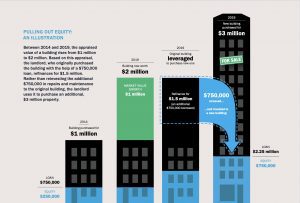
Breaking NYC’s Housing Speculation Cycle
When wealthy investors treat homes like poker chips, it is the tenants who end up losing. How do we interrupt the vicious cycle of speculation and displacement?

How Hidden Property Owners and Bad Landlord Patterns Are Revealed in NYC
Housing tools in New York City demystify building ownership information and help renters, policymakers, and housing advocates spot and address problematic landlord behavior. Could tech-savvy groups outside The Big Apple replicate these tools in their communities?

After Ida, How Can Affordable Housing Withstand Climate Impacts?
What lessons can Ida offer to affordable housing managers and owners whose properties are at risk of damage from extreme weather events?

Which Community Benefits Agreements Really Delivered?
Are the neighborhoods impacted by large development getting the jobs and affordable housing they were promised? Shelterforce looks back at several cities where community benefits agreements were won to find out where those agreements now stand.

Security Deposits Are a Barrier to Affordable Housing. What Can Be Done?
There are many new approaches to the security deposit problem—some have been lauded by affordable housing advocates, and others have been met with skepticism and mistrust—often with good reason. Here’s a look at a few commercial, charitable, and legislative solutions being explored.

Tenant Advocates Win as Security Deposit Bill Is Vetoed in Baltimore
Baltimore’s mayor vetoed a “Renter’s Choice” law after housing advocates warned of the predatory potential of selling deposit alternatives to struggling tenants.

Health Care Institutions Invest in Tenant Protections for Community Health
Health care institutions are expanding from funding development to supporting housing justice and tenant rights policy.

Security Deposit Alternatives: The Misleading Marketing of ‘Renter’s Choice’
Dozens of cities and states are considering legislation allowing alternatives to upfront security deposits, such as “security deposit insurance.” The only problem? It’s not actually insurance.
